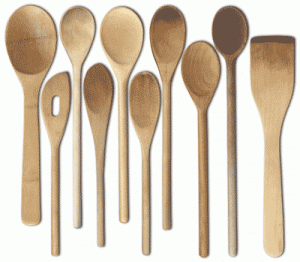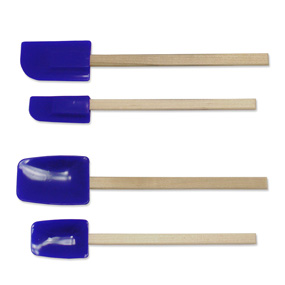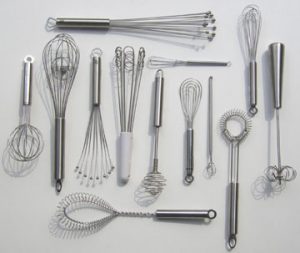One of the missions of this blog is to help new cooks or cooks who’ve been away from the kitchen for a while. Through these pages, you can learn about what pots and pans you need, dishware, appliances and which ones you might be able to do without. We like the sparse kitchen approach. But there are many useful tools you need. The problem is you seem to collect tools and gadgets like dust bunnies under your bed. And every home kitchen has a drawer full of tools and junk.
There are a number of tools you’ll need to mix, stir, flip, turn and move around food, both while cooking and before. These utensils can cover a wide variety of sizes, shapes, materials and uses from simple to multi-function.
Wooden tools are the oldest known to our civilization and they are still used and useful. Among the most useful are wooden spoons. They are non-reactive and can be used with all types of food. Metal spoons can react with some foods and lend it a metallic taste. Wood can be used with non-stick cookware and a useful insulator to heat, up to a point. Your typical wooden spoon will cost around $7. At first, the wood may feel a little rough in your hand, but that will go away with use. Other wooden tools are stir-fry paddles, spatulas, pasta forks and salad tongs.
Another useful material that’s come on the market in recent years is silicon. A silicon spatula is a great utensil. It’s heat resistant and non-stick. Some come with a slightly bowled head making it sort of a combination between a spoon and scraper. Silicon can be used to cook with as well for mixing and off-the-heat functions. This also costs around $7 up to $15 for each piece depending on size and brand.
Other useful spatulas are models used for flipping pancakes and burgers, ones that help lift out pie, cake or lasagna, fish turners, scrapers, egg turners in heat-resistant plastic and metal, and more. If you can only have one, go for the silicone spoon spatula, it is the most versatile.
Most mixing jobs require a whisk, depending on the consistency of the mix. There’s just as many different kinds of whisks as there are spoons and spatulas. The best ones are made of metal and have a metal handle. Avoid the plastic ones, they just collapse under the pressure. Also avoid wooden handles that can’t go into the dishwasher. And stay away from the metal handles that look like springs, as they trap food particles and moisture. If a whisk develops rust, throw it away. Select a whisk of about medium size that will feel good in your hand. You can add to your collection later as needs arise.
The kitchen tools and gadget can accumulate quickly, so select the ones you use most with some care. There are lots of other kitchen tools that can be useful, but most of them aren’t needed as kitchen basics. Those are in the intermediate level. Those are things that are good to have, but not part of the minimum needed to feed yourself. What tools you choose will have a lot to do with the foods you eat and like most. Try to avoid specialized utensils in favor of more generalized tools.





